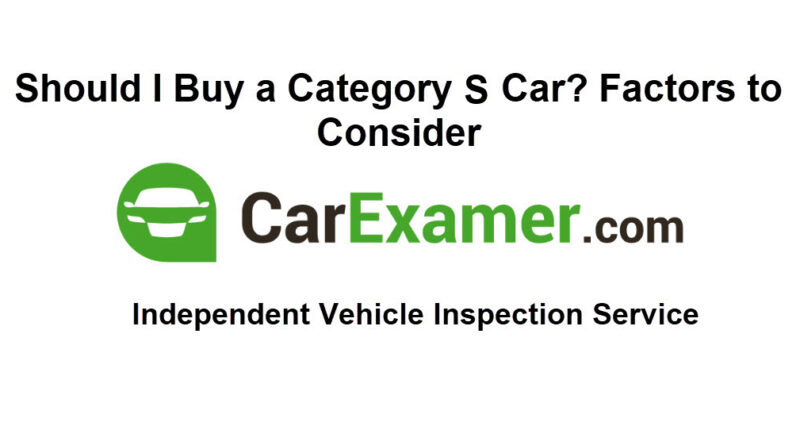Should I Buy a Category S Car? Factors to Consider
When considering purchasing a used car, you may come across vehicles labeled as Category S, which means they have been declared an insurance write-off due to structural damage. Deciding whether or not to buy a Category S car requires careful consideration of several factors. Here are some key points to consider before making your decision. However we at the CarExamer do not advise to consider one due to poor repair quality on these vehicles. Average 9 of the 10 vehicles are repaired to poor standard this is what inspectors see. Remember mostly all vehicles may not be repaired to an industry standard. Car dealers buy them to make quick money.
- Price and Cost of Repairs: Category S cars are often priced lower than comparable non-accident-damaged vehicles. However, it’s important to factor in the cost of repairs required to bring the car back to a roadworthy condition. Obtain estimates from reputable repair shops to determine the potential costs involved.
- Thorough Inspection: Before purchasing a Category S car, it is crucial to conduct a comprehensive inspection. Engage a professional mechanic or qualified technician to evaluate the extent of the structural damage and assess the repairs needed. This will give you a clearer picture of the car’s condition and help you make an informed decision.
- Quality of Repairs: If you decide to proceed with buying a Category S car, ensure that the repairs are carried out by experienced professionals who follow proper repair procedures and use genuine parts. This is important for safety and to maintain the vehicle’s value.
- Insurance Considerations: It’s worth noting that insuring a Category S car may come with higher premiums due to its accident history. Contact insurance providers to understand their policies and cost implications before finalizing your purchase.
- Resale Value: Owning a Category S car may impact its resale value compared to a similar car without an accident history. Potential buyers may be wary of purchasing a vehicle with a structural damage record. However, if you plan to keep the car for a long time, the impact on resale value may be less significant.
- Safety and Roadworthiness: Ensure that the necessary repairs have been carried out to restore the structural integrity and safety of the vehicle. Thoroughly inspect the car’s components, including airbags, suspension, and brakes, to ensure they are in proper working order.
- Vehicle History Check: Conduct a detailed vehicle history check using the vehicle identification number (VIN) to uncover any additional information about the car’s accident history, previous repairs, and mileage discrepancies. This will provide valuable insights into the vehicle’s background.
- Personal Comfort Level: Ultimately, the decision to buy a Category S car depends on your comfort level with owning a previously damaged vehicle. Some individuals may be willing to take on the repairs and potential challenges associated with Category S cars, while others may prefer to avoid them altogether.
In conclusion, buying a Category S car can be a viable option if you consider the factors mentioned above and proceed with caution. If you are unable to view previous accident damage pictures from seller and invoices from qualified accident repair bodyshop we advise to walk-away. Thorough inspections, proper repairs, and understanding the potential impact on insurance and resale value are key. It is important to make an informed decision that aligns with your budget, safety concerns, and long-term plans for the vehicle. Consulting with professionals and conducting due diligence will help you make a more informed choice.
Buying a used VW. Buying used vauxhall, BMW, Jaguar, Ford, Volvo, Range rover, Bentley, Aston Martin, Porsche, Ferrari, Lamborghini, Maserati, Hyundai, Tesla, Honda, Pagani

